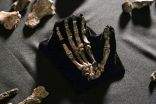The representative survey of more than 3,200 U.S. adults finds that, on the 12 multiple-choice questions asked, Americans gave more correct than incorrect answers. The median was eight correct answers out of 12 (mean 7.9). Some 27% answered eight or nine questions correctly, while another 26% answered 10 or 11 items correctly. Just 6% of respondents got a perfect score.
Most Americans (86%) correctly identify the Earth's inner layer, the core, as its hottest part, and nearly as many (82%) know uranium is needed to make nuclear energy and nuclear weapons.
Americans fare well as a whole when it comes to one aspect of science history: Fully 74% of Americans correctly identify Jonas Salk as the person who developed the polio vaccine from among a list of other scientists that included Marie Curie, Albert Einstein and Isaac Newton.
And most Americans can distinguish between astronomy and astrology. Seventy-three percent of adults recognize the definition of astrology as the study of how the position of the stars and planets can influence human behavior. By comparison, 22% of adults incorrectly associate this definition with astronomy, while another 5% give some other incorrect response.
But other science-related terms and applications are not as well understood. Far fewer are able to identify the property of a sound wave that determines loudness. Just 35% correctly answer amplitude, or height. Some 33% incorrectly say it is frequency and 23% say it is wavelength. And just 34% correctly state that water boils at a lower temperature in a high-altitude setting (Denver) compared with its boiling point near sea level (Los Angeles).
"As science issues become ever-more tied to policy questions, there are important insights that come from exploring how much Americans know about science," said lead author Cary Funk, an associate director of research at Pew Research Center. "Science encompasses a vast array of fields and information. These data provide a fresh snapshot of what the public knows about some new and some older scientific developments - a mixture of textbook principles covered in K-12 education and topics discussed in the news."
The data show that adults with higher education levels are more likely to answer questions about science correctly. In this survey, education proves to be a major factor distinguishing higher performers. While the questions asked relate to a small slice of science topics, there are sizeable differences by education on all 12 multiple-choice questions. This pattern is consistent with a 2013 Pew Research Center report on this topic and with analysis of the factual knowledge index in the National Science Board's Science and Engineering Indicators.
Adults with a college or postgraduate degree are more than twice as likely to get at least eight out of 12 questions right, compared with adults with a high school diploma or less (82% vs. 40%). Those with a postgraduate degree score an average of 9.5 correct answers out of 12, while those with a high school education or less get an average of 6.8 correct.
Fully 57% of adults with a postgraduate degree get 10 to 12 correct answers, whereas this is true for 18% of those with a high school diploma or less.
On all 12 questions, there is at least a 13 percentage point difference in correct answers between the highest- and lowest-educated groups. The largest difference is found in a question about the loudness of a sound. A 62% majority of those with a postgraduate degree correctly identify the amplitude (height) of the sound wave as determining its loudness, as do 52% of those with a four-year college degree. By contrast, 20% of those with a high school education or less answer this question correctly.
In addition to educational differences, gender gaps are evident on these science topics. The survey also finds differences in science knowledge between men and women on these questions, most of which connect to physical sciences. Men, on average, are more likely to give correct answers, even when comparing men and women with similar levels of education.
Men score an average of 8.6 out of 12 correct answers, compared with women's 7.3 correct answers. Some 24% of women answer 10 or more questions correctly, compared with 43% of men who did this.
The largest difference between men and women occurs on a question asking respondents to select from a set of four images that illustrate what happens to light when it passes through a magnifying glass. Some 55% of men and 37% of women identify the correct image showing the lines crossing after they pass through a magnifying glass, a difference of 18 percentage points.
Men (73%) and women (72%) are equally likely to identify the definition of astrology from a set of four options, however. And on the question about which layer of the Earth is hottest, there are only modest differences, with 89% of men and 84% of women selecting the correct response.
Past Pew Research Center studies found women were at least equally likely than men to answer several biomedical questions correctly such as that resistant bacteria is the major concern about overuse of antibiotics. And, women were slightly more likely than men to recognize a more effective way to test a drug treatment in one previous Pew Research Center survey.
The survey also found differences in science knowledge associated with race and ethnicity. Overall, whites know the correct answer to more of these questions than Hispanics or blacks. Whites score a mean of 8.4 items out of 12 correct, compared with 7.1 among Hispanics and 5.9 among blacks. The pattern across these groups and the size of the differences vary, however. These findings are consistent with prior Pew Research Center surveys on this topic. Racial and ethnic group differences are also found on the factual science knowledge index collected on the General Social Survey, even when controlling for education level.
One of the largest differences between blacks and whites occurs on a question about the ocean tides: 83% of whites compared with 46% of blacks correctly identify the gravitational pull of the moon as one factor in ocean tides. (Hispanics fall in between these two groups, with 70% answering this question correctly.)
On one of the more difficult questions, a roughly equal share of whites (36%) and blacks (33%) correctly identify a difference found in cooking at higher altitudes: that water boils at a lower temperature. A quarter (25%) of Hispanics answered this question correctly.
Generally, younger adults (ages 18 to 49) display slightly higher overall knowledge of science than adults ages 65 and older on the 12 questions in the survey. The oldest adults - ages 65 and up - score lower, on average 7.6 out of 12 items, compared with those under age 50. But adults under age 30 and those ages 30 to 49 tend to identify a similar mean number of items correctly.
Fully eight-in-ten (80%) adults ages 18 to 29 correctly identify radio waves as the technology underlying cell phone calls. By contrast, 57% of those ages 65 and older know this.
On some questions there are no differences in knowledge across age groups. And, when it comes to one aspect of science history, older adults (ages 65 and older) are more likely than younger adults to identify Jonas Salk as the person who developed the polio vaccine. Fully 86% of those ages 65 and older correctly identify Salk as the vaccine's developer, compared with 68% of adults ages 18 to 29.
The findings are based on a nationally representative survey of 3,278 randomly-selected adults that participate in Pew Research Center's American Trends Panel. The survey was conducted Aug. 11-Sept. 3, 2014 and included 12 questions, some of which included images as part of the questions or answer options. Along with the survey, a quiz with the 12 questions asked is also available at http://www.pewresearch.org/quiz/science-knowledge/.
INFORMATION:
These findings will be available at: http://www.pewinternet.org/2015/09/10/what-the-public-knows-and-does-not-know-about-science
For more information, or to arrange an interview, please contact Dana Page at 202.419.4372.
Pew Research Center is a nonpartisan fact tank that informs the public about the issues, attitudes and trends shaping America and the world. It does not take policy positions. END

